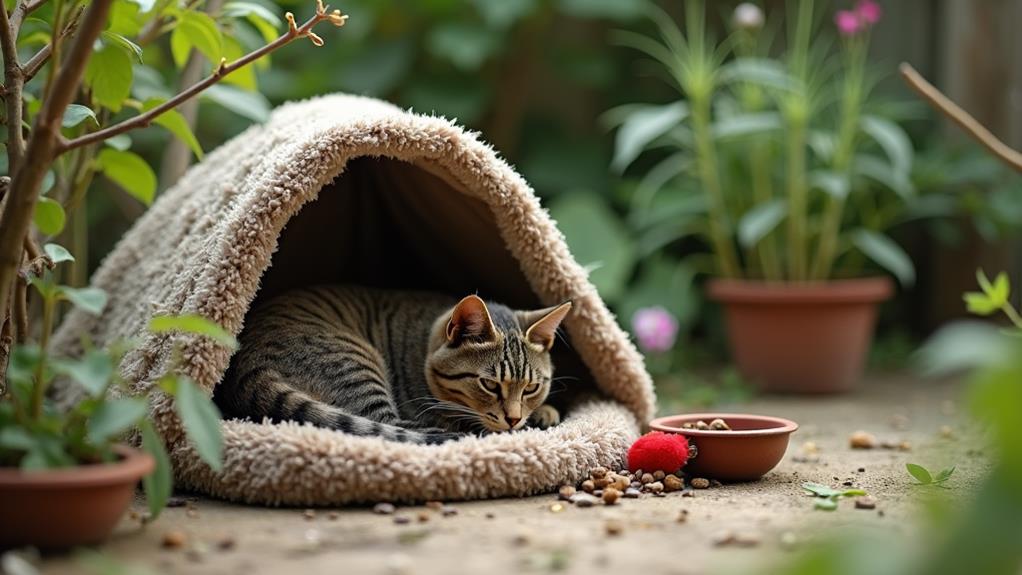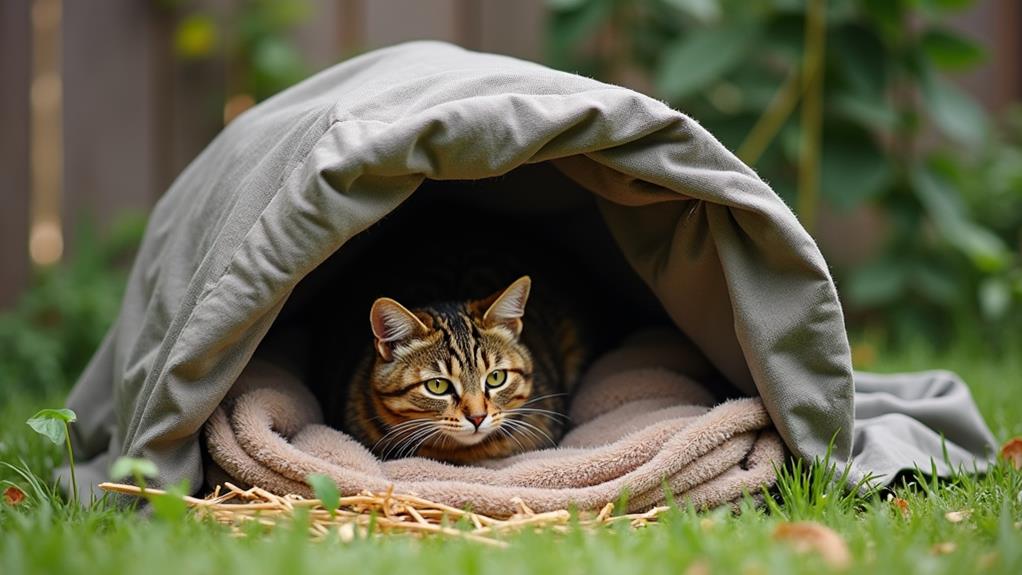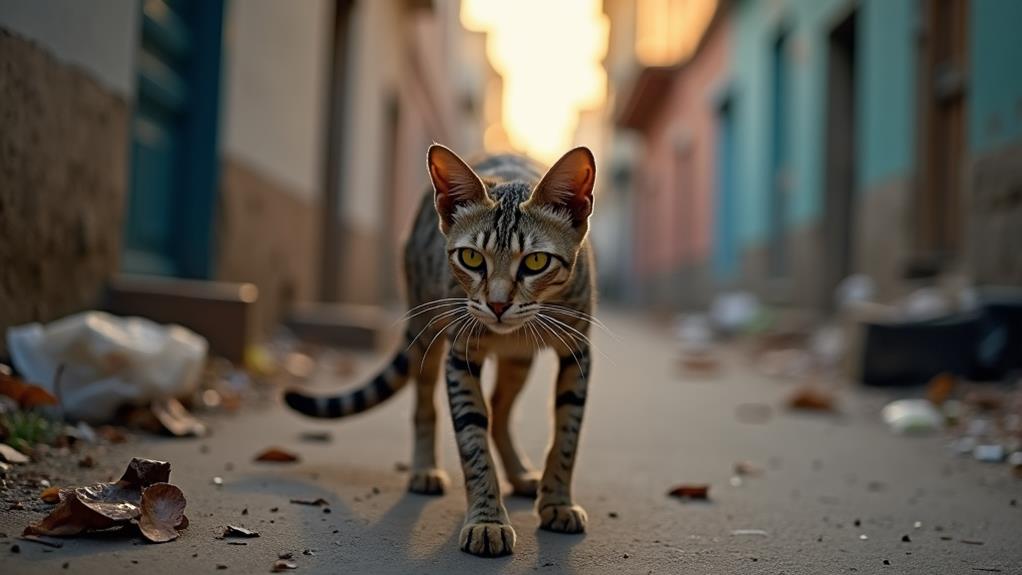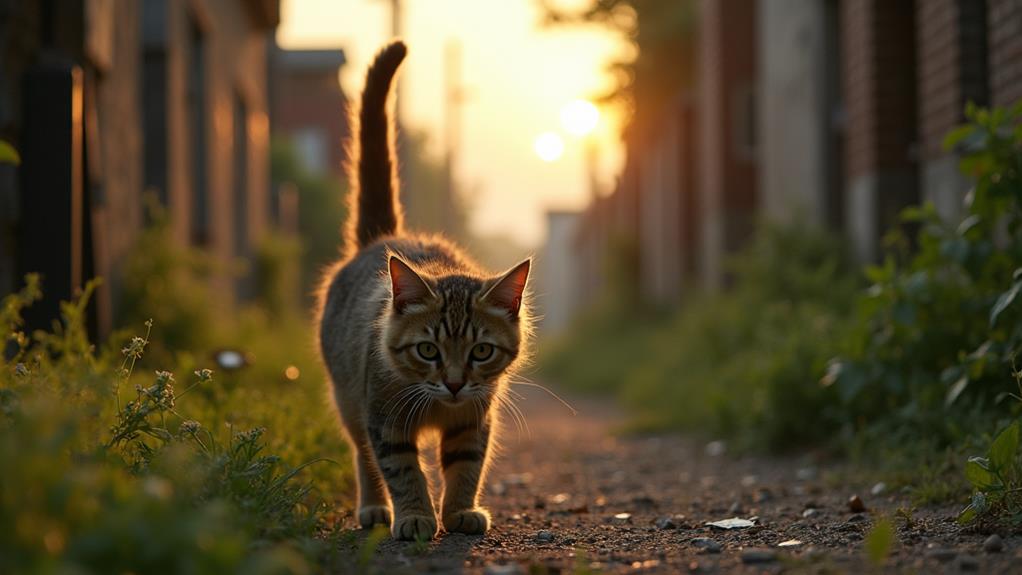How to Help a Pregnant Feral Cat: Care and Support Tips

To help a pregnant feral cat, initially understand her skittish behavior and create a stable environment to reduce stress. Offer high-quality kitten food and clean water to meet her nutritional needs. Set up a quiet, secure shelter with soft bedding to give her a safe space. Monitor her health discreetly, using non-intrusive methods like cameras, and keep track of any behavioral changes. Prepare a warm, clean birthing area and guarantee continuous access to food post-birth. Engage with community resources for support, such as veterinary services and local rescue programs. Uncover more tips to improve her care and well-being.
Understanding Feral Cat Behavior
Feral cats often display skittish behavior, making it essential to understand their natural wariness around humans. As you approach a feral mother cat, keep in mind that her distrust isn't personal; it's a survival instinct. These cats have learned to associate human interaction with potential threats, so patience is key. You'll notice signs of stress, such as flattened ears or a crouched posture. By recognizing these signals, you can gauge her comfort level and adjust your approach accordingly.
Creating a stable environment is important to reducing stress for a feral mother cat. She thrives best in familiar surroundings. Any changes, like confinement, can heighten her anxiety, potentially leading to health issues for both her and her kittens. Your role is to provide a quiet, secure space where she feels safe. This emotional support helps minimize stress and supports her natural instincts to care for her young.
Nutritional Needs During Pregnancy
Caring for a pregnant feral cat involves understanding her nutritional needs to guarantee she stays healthy throughout her pregnancy. Providing the right diet is essential, as feral moms often struggle to find adequate food sources. Kitten food is an excellent choice because it's rich in protein and fat, meeting the increased nutritional needs of a pregnant feral. Consistent feeding of high-quality cat food is critical to prevent nutritional deficiencies that could lead to complications for both the mother and her kittens.
Here's how you can support a pregnant feral cat's nutritional needs:
- Provide High-Quality Cat Food: Choose kitten food with higher protein and fat content. It's designed to meet the demanding nutritional needs of pregnancy and lactation.
- Establish a Feeding Routine: Feed her at the same times each day. A stable feeding routine guarantees she receives the necessary nutrients for her health and the development of her kittens.
- Ensure Access to Fresh Water: Clean, fresh water is crucial, especially as her hydration needs increase post-birth during lactation.
Creating a Safe Shelter

Creating a safe shelter for a pregnant feral cat is essential to guarantee her well-being and the successful birth of her kittens. Start by choosing a quiet, secluded area where she can feel secure and relaxed, free from disturbances. This space should allow the mother cat to have privacy as her pregnancy progresses. Incorporate a nesting box within this area, filled with soft bedding materials like towels or blankets. These provide comfort and warmth, important for both the mother and her developing kittens.
To maintain a warm environment, especially in colder months, consider adding weather-resistant heating units designed for outdoor use. Pregnant cats have increased warmth needs, so ensuring a consistently cozy atmosphere is critical. Also, make sure the shelter is secure from potential predators, offering the mother cat peace of mind as she prepares for giving birth.
Regularly check and clean the shelter to keep it hygienic. This reduces the risk of infections or health issues for both the mother cat and her kittens. By creating a safe shelter with these features, you provide the pregnant feral cat with the best possible environment to nurture her young.
Monitoring and Health Checks
Once you've confirmed the pregnant feral cat has a safe shelter, it's vital to keep an eye on her health and well-being. Monitoring her from a distance minimizes stress and allows you to detect signs of preparation for birth. Watch for nesting behavior and an increased appetite, as these are common indicators. Here's a quick guide to help you with health checks:
- Observe behavior: Keep an eye out for unusual behavior, distress, or bleeding. These could signal complications with the pregnancy. Staying vigilant is key to guaranteeing the safety of both the mother and her kittens.
- Non-intrusive monitoring: Use a pet camera to track her health without causing further stress. This allows you to observe her closely while maintaining a respectful distance, vital for pregnant ferals.
- Diet and nutrition: Provide high-quality kitten food to meet her increased nutritional needs during pregnancy and lactation. This supports her health and improves outcomes for her kittens.
Keep a log of any behavioral or health changes. This record can be invaluable if you need to consult a veterinarian. Regular health checks, coupled with careful monitoring, guarantee that the pregnant feral receives the care she needs with minimal stress.
Preparing for Kitten Birth

As you prepare for the kitten birth, making certain the mother cat has a calm and safe environment is vital. Start by setting up a clean, quiet, and warm birthing area, ideally with a nesting box. This space should provide comfort and safety for the pregnant cat during labor. A feral mom needs to feel secure, so choose a location where she won't be disturbed by noise or activity. Gather significant supplies like clean towels and a heating source to keep the newborn kittens warm once they arrive.
Monitoring the mother cat for labor signs is significant. Look for nesting behavior or increased vocalization, but remember to remain unobtrusive. Respect her natural instincts and give her space to feel in control of the process. While you should be ready to assist if complications occur, it's best to let the feral mom lead unless veterinary intervention becomes necessary.
Once the kittens are born, immediately make certain that the mother cat has access to nutritious food and fresh water. This will support her recovery and nursing needs. By preparing in advance, you're helping create a supportive environment for both the mother and her new kittens.
Post-Birth Care Essentials
After guaranteeing a safe and comfortable environment for the birth, it's time to focus on the fundamentals of post-birth care for the mother cat and her kittens. Initially, you'll want to monitor the kittens' nursing to verify they're getting enough milk. Check their weight and activity levels daily to assess their health. A mother cat's natural instincts will guide her, but your watchful eye guarantees everything's progressing smoothly.
Providing the mother cat with nutritious kitten food is vital. She'll need the extra nutrients found in kitten food to support her energy needs during lactation. Adult cat food won't suffice, as it's lacking the necessary nutrients for her recovery and milk production.
Creating a quiet space is another significant step. This should be a safe area with clean bedding and minimal disturbances, helping the mother cat feel secure and focused on her kittens. Here are the fundamentals:
- Monitor the kittens' nursing and health.
- Provide nutritious kitten food for the mother cat.
- Create a quiet space with clean bedding.
Community Resources and Support

Many community resources are available to help you support a pregnant feral cat and her kittens. Local organizations often offer vital services like spaying and neutering, which help manage feral cat populations and prevent unwanted litters. By reaching out to these groups, you can access valuable community support that provides education on responsible care practices, such as feeding, sheltering, and monitoring the cats' health. This guarantees the well-being of the feral cats you're assisting.
Veterinary clinics in your area may offer low-cost or mobile services that make it easier to provide necessary medical care without the hassle of transporting cats. These services are critical for safeguarding the health of both the mother and her kittens. Moreover, getting involved with cat rescue organizations can offer you hands-on experience through volunteer opportunities. You can learn about fostering and socialization, empowering you to make a significant impact.
Lastly, consider donating to local feral cat programs. Your contributions can improve the resources available for rescue and rehabilitation efforts, guaranteeing vital services like spaying, medical care, and community education continue to thrive. With these community resources, you can make a real difference in the lives of feral cats.




